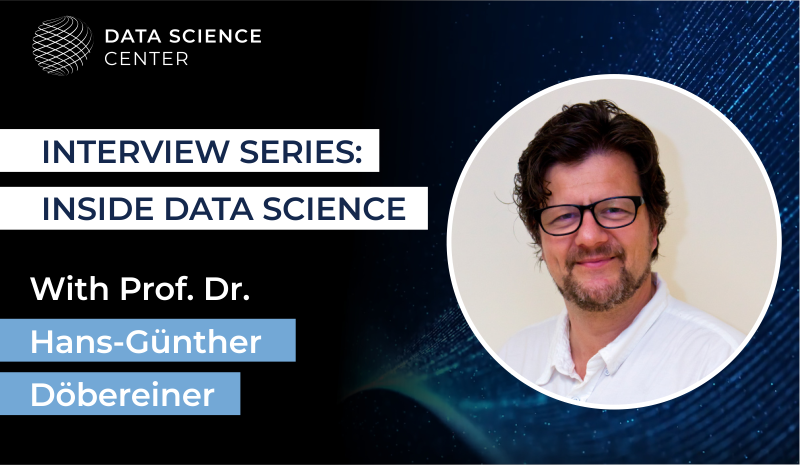28.06.2021
| Inside Data Science |
Data Science and Research Data Management in Transdisciplinary Physics
Hans-Günther Döbereiner talks about his research in biological physics and his vision for sustainable research data management and FAIR data in NFDI4Phys.
What topics are you currently working on in your research?
We focus on structure formation in living matter. We observe single cells of mouse fibroblasts during cell movement as well as the transport network dynamics of the slime mold
Physarum polycephalum during foraging. The latter species has become famous in recent years for its problem solving capabilities despite lacking a brain.
Physarum and other comparatively simple species, like
Hydra or
C. elegans, have ignited a new field called basal cognition. We study similarities in collective oscillation patterns in animal brains and the tubular network of
Physarum with its peristaltic waves.
How important is data to your research?
As a biological physicist, I’m interested in new physical phenomena and principles of nature from cells to agents and populations or societies. Experimental data are the starting point of our scientific work. They feed our workflows which feedback via theoretical analysis and model building onto experimental design.
What role does data science play in your research? Do you see yourself more as a user, a method developer, a basic researcher, or perhaps something completely different?
I am speaker of the consortium
NFDI4Phys. We develop innovative research data management and provide related services to our communities. Work in the National Research Data Infrastructure has fascinated me and fostered our research. My group members are using artificial intelligence methods in our daily research routines. It has been a rewarding process to align several domains of physics behind the common goal to make data FAIR.
Which data science methods and technologies are in the focus of your research or could also become interesting in the future?
NFDI4Phys is concentrating on heterogenous data sets. The future standard of the data net will be FAIR digital objects which are kind of digital twins of objects in the real space. FDOs and canonical workflows of research will help us to get our jobs done in all disciplines. I am a member of the semantic working group of the international FAIR DO forum. The advent of Quantum Computing will boost Data Science enormously. However, we need to understand the physics of artificial intelligence and learn to use quantum computers. NFDI4phys has a particular focus in this respect.
What are your main challenges in dealing with data?
The main challenge is to do RDM without being a burden to the researcher. RDM needs to become helpful to researchers at all stages of a particular project in order to be accepted by research groups.
And finally, what is your personal motivation for joining the Data Science Center?
It is the principle of Transdisciplinary Physics to engage in deep discussion with colleagues from other disciplines in order to learn their language. DSC Bremen is an ideal platform to foster scientific exchange. I’m most fascinated about the prospects of semantic analysis with AI methods. We will eliminate the qualitative by quantifying it with semantic metrics to boldly go where no own has gone before.
You can learn more about Hans-Günther Döbereiner’s activities in his talk
“Emergence of Universality“ in the Data Science Forum on 01.07.2021.
« back
28.06.2021 | Inside Data Science
Data Science and Research Data Management in Transdisciplinary Physics
Hans-Günther Döbereiner talks about his research in biological physics and his vision for sustainable research data management and FAIR data in NFDI4Phys.
What topics are you currently working on in your research?
We focus on structure formation in living matter. We observe single cells of mouse fibroblasts during cell movement as well as the transport network dynamics of the slime mold
Physarum polycephalum during foraging. The latter species has become famous in recent years for its problem solving capabilities despite lacking a brain.
Physarum and other comparatively simple species, like
Hydra or
C. elegans, have ignited a new field called basal cognition. We study similarities in collective oscillation patterns in animal brains and the tubular network of
Physarum with its peristaltic waves.
How important is data to your research?
As a biological physicist, I’m interested in new physical phenomena and principles of nature from cells to agents and populations or societies. Experimental data are the starting point of our scientific work. They feed our workflows which feedback via theoretical analysis and model building onto experimental design.
What role does data science play in your research? Do you see yourself more as a user, a method developer, a basic researcher, or perhaps something completely different?
I am speaker of the consortium
NFDI4Phys. We develop innovative research data management and provide related services to our communities. Work in the National Research Data Infrastructure has fascinated me and fostered our research. My group members are using artificial intelligence methods in our daily research routines. It has been a rewarding process to align several domains of physics behind the common goal to make data FAIR.
Which data science methods and technologies are in the focus of your research or could also become interesting in the future?
NFDI4Phys is concentrating on heterogenous data sets. The future standard of the data net will be FAIR digital objects which are kind of digital twins of objects in the real space. FDOs and canonical workflows of research will help us to get our jobs done in all disciplines. I am a member of the semantic working group of the international FAIR DO forum. The advent of Quantum Computing will boost Data Science enormously. However, we need to understand the physics of artificial intelligence and learn to use quantum computers. NFDI4phys has a particular focus in this respect.
What are your main challenges in dealing with data?
The main challenge is to do RDM without being a burden to the researcher. RDM needs to become helpful to researchers at all stages of a particular project in order to be accepted by research groups.
And finally, what is your personal motivation for joining the Data Science Center?
It is the principle of Transdisciplinary Physics to engage in deep discussion with colleagues from other disciplines in order to learn their language. DSC Bremen is an ideal platform to foster scientific exchange. I’m most fascinated about the prospects of semantic analysis with AI methods. We will eliminate the qualitative by quantifying it with semantic metrics to boldly go where no own has gone before.
You can learn more about Hans-Günther Döbereiner’s activities in his talk
“Emergence of Universality“ in the Data Science Forum on 01.07.2021.
Interviewee:
Prof. Dr. Hans-Günther Döbereiner
Professor of Biological Physics
FB 01 – Physics and Electrical Engineering
Spokesperson NFDI4Phys
hgd@uni-bremen.de
« back




